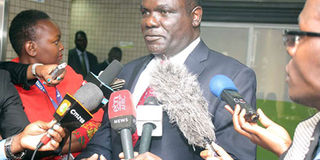IEBC wants elections held on different dates

Independent Electoral and Boundaries Commission Chairman Wafula Chebukati. The agency has released a post-election report. PHOTO | FILE | NATION MEDIA GROUP
What you need to know:
- The commission also wants MPs to change the Constitution to realign the term of county assemblies with that of the other elective seats.
- IEBC wants the presidential and parliamentary elections held at the same time while the vote for governors and ward representatives be pushed to a different date.
The Independent Electoral and Boundaries Commission has called for major changes on the conduct of the 2022 poll.
In a draft post-election evaluation report of the 2017 polls expected to be released on Tuesday, the commission gives a blow by blow account of what went wrong, why it thinks it lost the case at the Supreme Court and its views on addressing the challenges it faced.
IEBC wants the presidential and parliamentary elections held at the same time while the vote for governors and ward representatives be pushed to a different date.
This would mean an amendment to the law, which sets the date for Kenyans to make their choice in the six seats as the second Tuesday of August of every fifth year.
FATIGUE
It is not clear if the commission wants lawmakers to specify different dates for the election of members of the National Assembly and the Senate, with previous proposals on the subject calling for senators to be elected on the same day as governors.
“Conducting six elections in one day resulted in fatigue among electoral officials. Some of the errors witnessed were as a result of the fatigue,” the report says.
The commission also wants MPs to change the Constitution to realign the term of county assemblies with that of the other elective seats “for legal clarity”.
The law says that the term of a ward representative is five years — a clause that resulted in the confusion witnessed when the County Assemblies Forum demanded that members be paid for the “remainder” of their term after the August 8, 2017 election.
They argued that having been elected on March 4, 2013, they were to remain in office until March 3, 2018.
STAFF TENURE
In another proposal, IEBC wants the nomination of its commissioners staggered "to ensure continuity and institutional memory".
Currently, IEBC has only its chairman Wafula Chebukati and commissioners Boya Molu and Abdi Guliye.
It followed the surprise resignations of vice chairperson Connie Nkatha and commissioners Paul Kurgat and Margaret Mwachanya, six months after the exit of Dr Roselyne Akombe.
“Ideally, commissioners should be in office for the entire electoral cycle, and where not possible, at least two years to the General Election. There is need to consider staggering the appointments so that the term of the entire commission does not end on the same date,” the report adds.
The Wafula Chebukati-led team was appointed just seven months to the General Election, after the Issack Hassan-led panel, which had close to two years to prepare for the 2013 polls, was forced out in 2016 when the opposition accused it of bias.
POLL PETITION
With a non-renewable term of six years, the remaining three commissioners will be in office until January 2023.
IEBC uses its case in 2017 when the presidential election results were nullified — the first on the continent and only the fourth in the world.
It calls for the extension of time to hear such petitions, an aspect it suggests played a huge part in IEBC losing the case.
The commission disputes the narrative that the Raila Odinga-led National Super Alliance was denied access to the electoral server, with its logs showing that at 34, the coalition had four more log-ins than all the other parties’ representatives combined.
Mr John Walubengo is named as the Nasa presidential election agent who logged in on behalf of the coalition.
SERVER
Jubilee’s Davis Chirchir is shown to have logged in 10 times, with Mr Collins Ndindi, an independent candidate agent, logging in six times as compared to the three, six, and five log-ins by Mr Japheth Kaluyu's agent, the United Democratic Party and the Thirdway Alliance respectively.
“Access was provided to Nasa and Jubilee agents, though for a shorter period of time than anticipated. At no time did the commission deliberately prevent access to the server.
"Indeed, once a secure connection was established, the server continued to be available and accessible until mid-October 2017 when it was redirected for use in the presidential rerun,” the report adds.
When the Supreme Court made the order for a scrutiny of the server, the IEBC explained, the commission availed pre-downloaded log-in trails, polling station allocation for every electronic kit, information about servers owned by the commission, technical partnerships agreement for election technology, among others.
FUNDING
This, the commission added, was rejected by Nasa which demanded live, real time access of the server, with a read-only capability — a process "that required much longer than the 48 hours given by the court".
“The design of the system required the commission to create special user accounts with permission and user rights to allow for log-in and download of the system logs.
"The process of granting secured access was longer than anticipated since it involved collaboration with ICT experts outside the country,” the IEBC says in a 249-page report that seems to deflect blame to other players in the electoral cycle.
Besides the extension of the time needed to hear and determine a presidential election case, the agency wants a change of laws to have uniformity in different courts, and the interpretation of what a recount on scrutiny means.
“It should include transport of ballot boxes and storage as it varies from one court to another,” the commission says.
The report also recommends funding throughout the electoral cycle "as disbursement of bulk funding in the last year of the electoral cycle does not do justice to planning”.





